A Priest for the World.
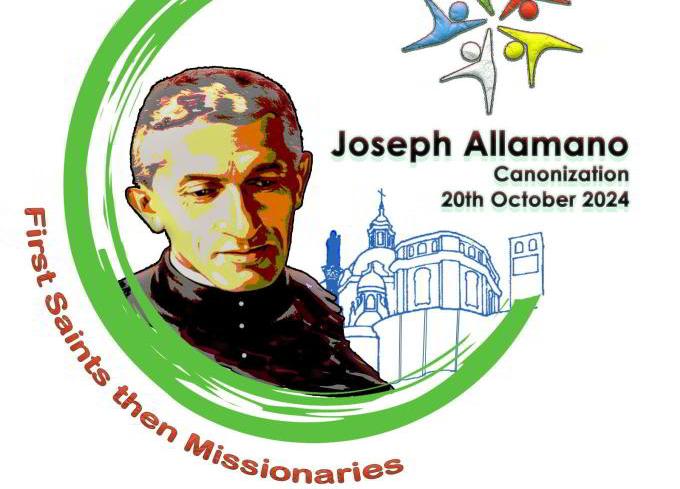
Giuseppe Allamano, founder of the Consolata Missionaries will be canonized on October 20th. Mission must be given the best.
He was born on January 21, 1851, in Castelnuovo d’Asti (now Castelnuovo Don Bosco), in Northern Italy. Educated in solid Christian virtues by his mother, the sister of Saint Joseph Cafasso, he then went to the school of Don Bosco, another illustrious fellow countryman. With firm intent, he responded to the call of the Lord and, having become a priest on September 20, 1873, he would have liked to devote himself to pastoral ministry but his archbishop assigned him to the formation of seminarians at the major seminary of the diocese of Turin.
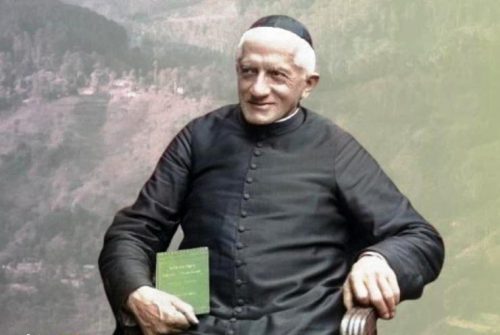
Giuseppe Allamano, founder of the Consolata Missionaries
He distinguished himself for his firmness in principles and his gentleness in asking for their implementation. In this task, as later in the formation of priests, he demonstrated excellent qualities, for which he was recognized as a true “master in the formation of the clergy”, “a truly perfect copy of his great predecessor and uncle”, Saint Joseph Cafasso.
At the same time, he continued his studies, obtaining a degree in theology from the Theological Faculty of Turin, and a qualification for university teaching. He was later appointed an adjunct member of the Faculty of Canon and Civil Law and also held the position of Dean in both Faculties. In 1880, he was appointed Rector of the sanctuary and the Ecclesiastical Convitto della Consolata. From then until his death, his activity always took place in the shadow of the Marian sanctuary of the diocese. He found it physically dilapidated and spiritually decayed. He took care of its restoration, expansion and embellishment, and increased its pastoral, liturgical and associative activity.
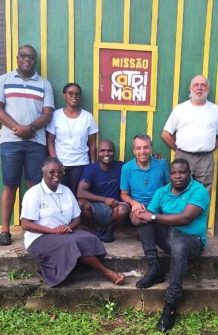
Consolata missionaries in the mission of Catrimani, in the land of the indigenous Yanomami people, in Amazonia. Photo MC
It became a centre of Marian spirituality and pastoral initiatives. He also contributed with the charisma with which he was endowed by God to advise, comfort and direct. People of all walks of life experienced the secrets of his enlightened mind and his great heart. The laity found in him support for new initiatives, required by the times: the press, Catholic Action and workers’ associations.
He reopened and directed the Ecclesiastical Convitto for the preparation of young priests for the apostolate. He took their spiritual, intellectual and pastoral priestly formation very seriously, updating it to new situations and needs. To give them a model, he undertook the Cause of Canonization of Cafasso, whose Beatification he had the joy of seeing on May 3, 1925.
He gave new vigour to the house for spiritual exercises annexed to the sanctuary. Driven by powerful zeal for the good of his brothers and by a lively sense of the universal Mission of the Church, he broadened his horizons to the entire world.
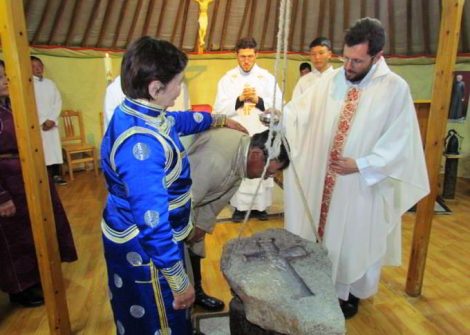
Cardinal Giorgio Marengo of the Consolata baptises a little girl during the Easter Vigil in Arvaiheer, Mongolia. Photo MC
He felt the urgency of Christ’s mandate to bring the Gospel to everyone. He found it unnatural that in his Church, fruitful with so many charitable institutions, there was not one dedicated solely to the missions. He decided to remedy this and to help those who were animated by the missionary ideal to realize their vocation. In 1901 he founded the Institute of Missionaries and in 1910 that of the Consolata Missionaries Sisters. While continuing his numerous commitments in the diocese, he devoted his main care to them, forming them in the spirit that he believed he had received from the Lord. Convinced that the Mission must be given the best, he aimed at quality rather than number. He wanted prepared evangelizers, “superlatively holy”, “zealous to the point of giving their lives”. On May 8, 1902, the first four missionaries, two priests and two lay brothers left for Kenya, soon followed by others. Giuseppe Allamano died on February 16, 1926, in Turin at the Consolata sanctuary. By proclaiming him Blessed on October 7, 1990, Pope John Paul II sealed the recognition that the people of God have paid him with various expressions: “the saint of the Consolata”, “provident and compassionate Father, educator and teacher of the clergy”, “priest for the world”. He will be canonized on October 20, World Mission Day.
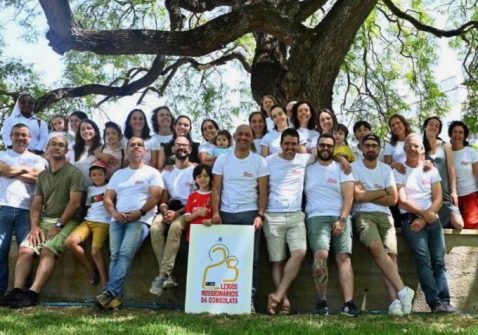
Lay Missionaries of the Consolata (LMC) from Portugal celebrating their 25th anniversary of life and mission. Photo MC
In recent decades, inspired by the missionary spirit of the Founder and by missionary spirituality and testimony, communities of Consolata Lay Missionaries (LMC) and Young Consolata Missionaries (JMC) have also sprung up. Starting from their lay state of life, they feel called to evangelisation and take on the lifestyle and spirituality of the Consolata, departing and committing themselves for a considerable period of time to a missionary project. Currently, the missionaries (fathers and brothers) are almost 1000 and the missionary sisters are almost 600. They are present in 33 countries. (C.C.)



